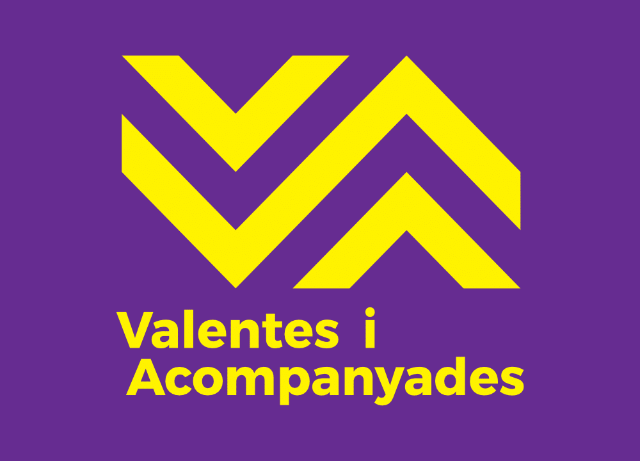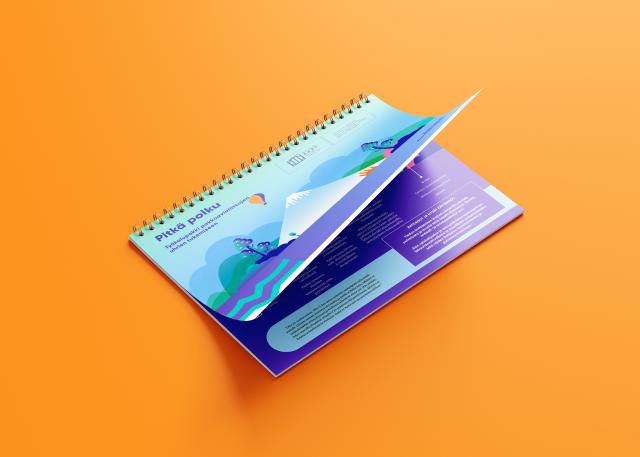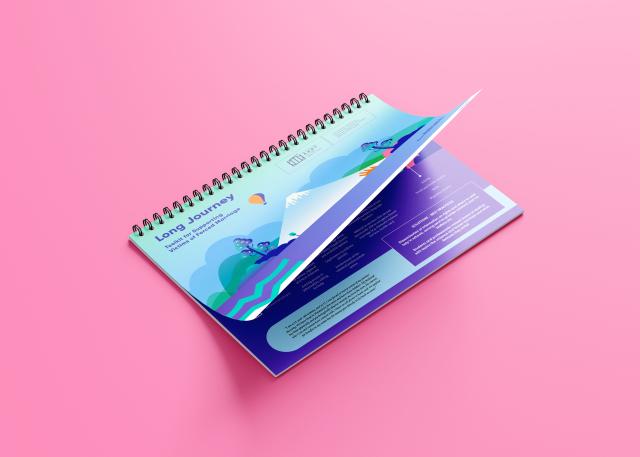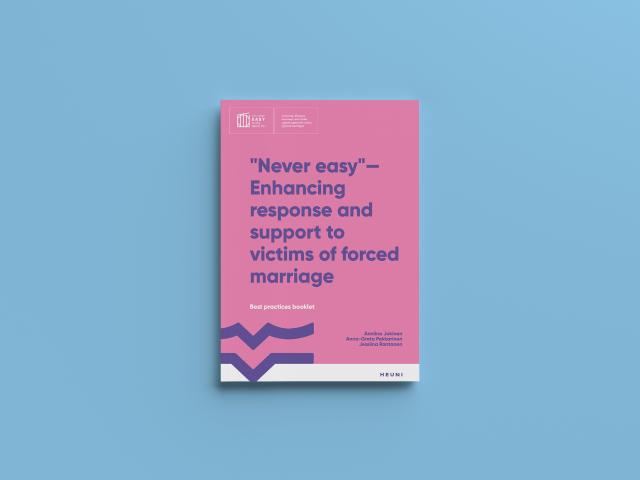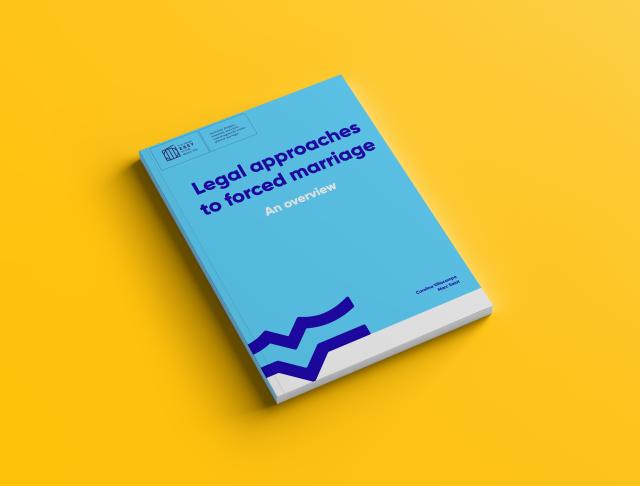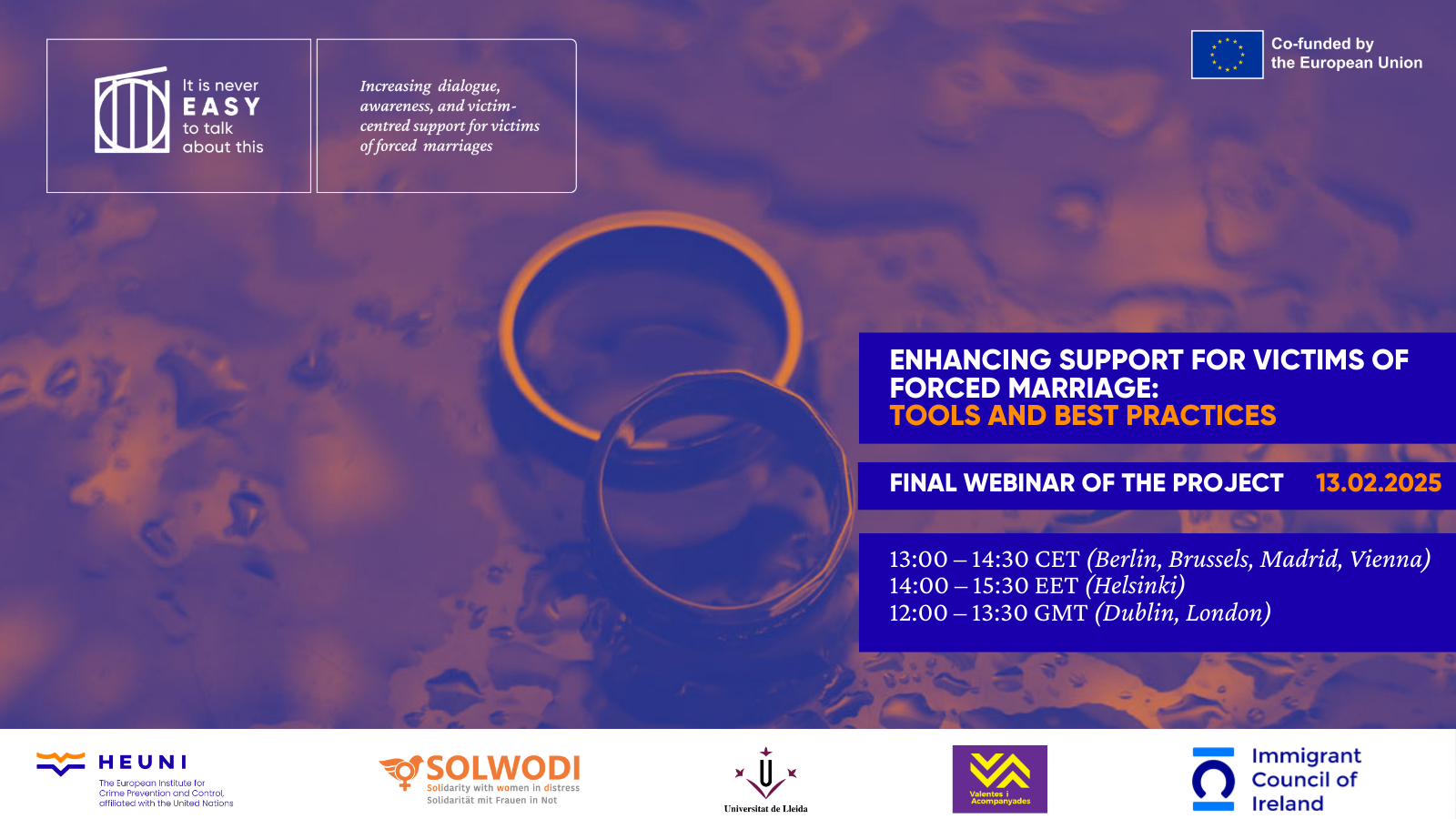
Target groups
The main target group are women, and to some extend girls (aged over 14), who are victims of forced marriage or are in danger of becoming victims in 4 EU Member States (Spain, Ireland, Germany, Finland), and professionals who encounter (potential) victims: victim-support workers, police, migration authorities, social workers, NGO workers, teachers, youth workers etc.
Project activities
The first component is the collection of best practices on victim identification and support leading to the development of a best practice booklet and a customer journey map based on interviews and assessing real case examples. Best practices will concentrate on analysing issues and concepts that have a practical relevance in the development of effective and victim-centred interventions.
The second component includes activities enhancing community dialogue and awareness as well as developing and offering culturally sensitive victim-centred services to victims such as one-on-one, family counselling, awereness raising events, peer support groups, podcasts.
Thirdly the capacity building component provides professionals with tools to better identify and support victims such as checklists for identification and support and sharing of legislative and multiagency working best practices among professionals nationally and transnationally. The activities are mutual learning workshops, a study-trip, expert roundtables, and webinars as well as disseminating information on best practices via media, social media, national and international professional networks.
#NEVER_EASY Podcast series
The four podcasts were developed by Valentes i Acompanyades (ViA) in close cooperation with local radio station Cadena SER Girona in Girona, Spain.
Podcast 1: “Love and Resistance: The Story of Arush and Sara”
This podcast tells the story of Arush, a young man from India who arrived in Barcelona eight years ago to work with his brother, and Sara, a young Pakistani woman who came to Spain in 2021 through family reunification. Despite their different backgrounds — Arush, a Hindu from a working-class family, and Sara, a Muslim from a wealthy family — they fell in love while working together in Arush's brother’s shop.
Their relationship soon faced strong opposition from Sara's family, who did not approve of her being with someone outside of her community. After attempting to flee to Germany together, Sara’s parents convinced them to return to Barcelona, promising acceptance. However, upon their return, Sara’s family reacted with hostility: they confined her at home, restricted her freedom, and even forced her into a virtual marriage with her father’s friend.
Determined to change her circumstances, Sara went to the police to report the forced marriage, exposing the abusive control imposed by her family. With the support of the organization Valentes i Acompanyades, she found refuge in a protected apartment and was able to reunite with Arush to build a life free from her family’s oppression.
This podcast presents an inspiring story of love and resilience in the face of migration challenges, cultural conflict, and family violence, highlighting Sara and Arush’s struggle to build a future together despite the barriers imposed by their families and cultures.
Podcast 2: Minal's Story “A Young Woman Between Two Cultures”
This podcast delves into the life of Minal, a 20-year-old woman of Pakistani origin who, after arriving in Barcelona at the age of three, feels more Catalan than Pakistani. Her childhood in the Raval neighbourhood was challenging, marked by cramped living conditions with her nine siblings, and an environment of frequent conflicts and economic hardships. Despite her desire to study and work, her parents expected her to handle household duties without providing her with emotional or financial support.
At 17, Minal began facing intense pressure to marry. Her school became her refuge, where supportive teachers and friends noticed signs of her distress. As tensions escalated with her father, who threatened to force her into marriage and destroy her documents to take her back to Pakistan, Minal made the decision to escape with the help of social services. She found shelter through the “Valentes y Acompañadas” program in Girona, marking the start of a new chapter in her life.
Despite the pain of breaking ties with her family, Minal has continued her studies in Law, aspiring now to build a life in which she can make her own decisions.
Podcast 3: Mariamma's Story
Mariana is a young woman from Guinea who was helped by the Valentes i Acompanyades Association. She remembers her childhood in her country, where, at the age of 14, she was forced into a marriage against her will. She wanted to live a normal life, study, and enjoy her youth like any girl her age, so she rejected the imposition of marriage. This decision caused great displeasure in her family, but Mariana stood her ground.
At 17, her parents moved to Spain and once again tried to arrange her marriage by force. While studying at an adult school, Mariana met someone from Valentes i Acompanyades, who provided her with support and a temporary place to stay. This led to a rupture in her family relationships, particularly with her mother, with whom she lost communication. Her mother also grew up in a culture of arranged marriages where women were prevented from studying or working and were expected to dedicate themselves solely to caring for the home and the well-being of men.
Despite lacking support from her family, Mariana never considered returning to Guinea, knowing that traditions would not change there. Thanks to the support of the association, she was able to study, work, and discover her own worth. Today, Mariana dreams of helping other women in similar situations, empowering them to choose their own paths and free themselves from being innocent victims of family traditions.
Podcast 4: Mariem's Story
Mariem is a 27-year-old woman who was born in Morocco. At the age of 17, she was forced to marry a cousin due to her family's traditions. After her marriage, she was taken to Spain by her husband, where she suffered abuse, disrespect, and a lack of affection. She lived without freedom; even to go shopping, she had to ask her husband for permission and always needed to request money for her basic needs.
Becoming aware of her situation, she managed to escape one day when she was alone with her son and went to a women's shelter in Barcelona. Although she was scared and uncertain about what awaited her, she thought it was better to be there with her child than to stay at home suffering abuse.
After six months, she had to return home because her documents had expired. Noticing no change in her husband's behavior, she decided to leave home for good. It was at this point that she received support from the Valentes i Acompanyades Association, which offered her accommodation and the chance to move forward, feeling free with her little one.
Mariem believes that her current situation is very good; she now has freedom and is happy with her son.
Contacts
Project coordinator (for all the general enquiries about the project), Finland
• Anniina Jokinen, Senior Programme Officer, European Institute for Crime Prevention and Control (HEUNI) [email protected]
Spain
• Carolina Villacampa Estiarte, University of Lleida, [email protected]
• Pablo Becerril Martínez, Associació Valentes I Acompanyades, [email protected]
Germany
• Hasmik Manukyan, Solwodi, [email protected]
Ireland
• Valéria Aquino, Immigrant Council of Ireland, [email protected]
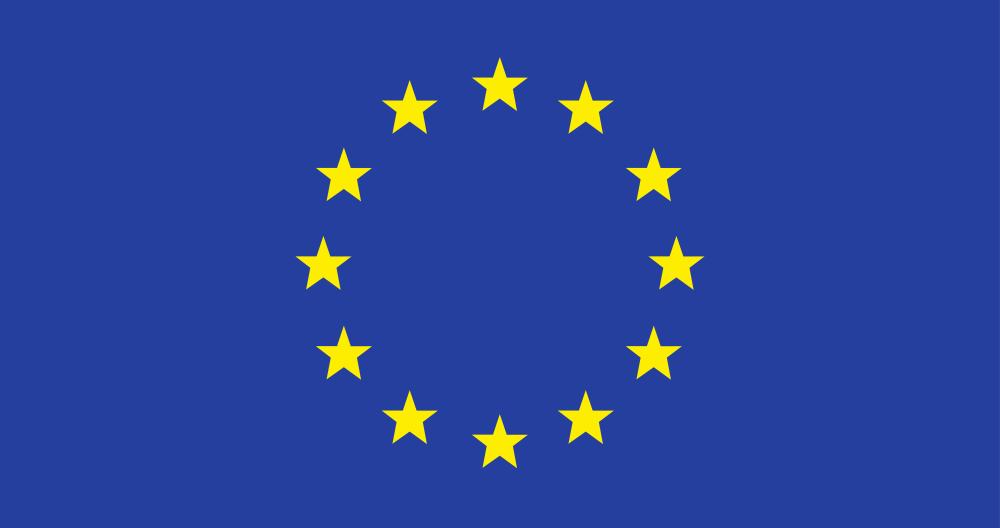
This project was co-funded by the European Union.
Grant Agreement: 101094147 — EASY — CERV-2022-DAPHNE







